
Good Climate News Roundup – March 2025
Mar 31, 2025
 Credit:mypubliclands, Flickr
Credit:mypubliclands, Flickr
Every week, we round up five of the best good climate news stories we’re celebrating. This week we cover restored wetland protections in Colorado, federal investments in public lands and conservation, a commitment to cutting food waste, the release of the Climate Capital Guidebook, and Mexico’s election of a climate scientist as its next president.
 Credit: BLM-Colorado, Flickr
Credit: BLM-Colorado, Flickr
Colorado is the first state to restore wetlands protections one year after the Supreme Court decision in Sackett v. EPA removed federal protections for wetlands and streams.
The Sackett decision severely limited which wetlands and streams qualify for protection under the Clean Water Act. It excluded ephemeral streams – temporary ones that flow only part of the year from snow melt or heavy rain – which are especially common in Colorado and other Western states. The new legislation ensures that Colorado wetlands and ephemeral streams are protected again under a permitting program which will oversee construction, road building and other activities affecting state waters.
Environmental advocates hope that Colorado’s breakthrough will pave the way for similar legislation in other states, while continuing to call on Congress to intervene and reintroduce federal regulations. Given that Colorado lawmakers achieved bipartisan support for this bill, there is potential for further progress nationwide.
Josh Kuhn, Senior Water Campaign Manager at LCV state affiliate Conservation Colorado
Source: Colorado Sun, Colorado Sun
 Credit: Deborah Lee Soltesz, University of Arizona, Western Lands Blog
Credit: Deborah Lee Soltesz, University of Arizona, Western Lands Blog
The Departments of Agriculture and the Interior proposed a $2.8 billion investment to protect public lands and support conservation efforts in the U.S.
This investment comes from the Great American Outdoors Act (GAOA) to protect and sustain public lands and Bureau of Indian Education (BIE)-funded schools. The proposed projects will take place in all 50 states, Washington D.C., and several U.S. territories.
Since the establishment of the GAOA Legacy Restoration Fund (LRF) in 2020, funds have been directed to the maintenance of critical infrastructure and facilities in U.S. national parks and forests, national wildlife refuges, recreation areas, and BIE-funded schools. The GAOA additionally provides full funding of $900 million annually to the Land and Water Conservation Fund, which secures public access and improves recreation opportunities on public lands, and helps preserve the local wildlife and ecosystem.
The new investment is expected to support over 20,000 jobs and contribute more than $2.5 billion to the economy. The projects will take place in urban, suburban and rural areas, ensuring the investment’s impact is far-reaching.
Source: USDA
 Credit: RawPixel, PxHere
Credit: RawPixel, PxHere
EPA, the Department of Agriculture, the Food and Drug Administration, and the U.S. Agency for International Development have reaffirmed their commitment to cutting food waste in half by the end of the decade.
Food waste is responsible for 58% of methane emissions from landfills, which are one of the largest sources of human-related methane emissions in the country. Reducing the amount of food waste in landfills will dramatically lower their methane emissions and reduce their impact on the climate.
EPA administrator Michael Regan said, “We are excited to continue this collaboration with our partners at USDA, FDA, and now welcome USAID, to join our efforts to reduce food waste, protect our environment, and address critical climate impacts, while saving families and businesses money and improving food security across the globe.”
Source: E&E
 Credit: Adam Schultz, Picryl
Credit: Adam Schultz, Picryl
The Biden-Harris administration released the Climate Capitol Guidebook (PDF) to help climate-related small- and medium-businesses identify and access federal funding opportunities from the President’s affordable clean energy plan.
The guidebook offers a simple and comprehensive outline of opportunities available through federal programs for climate-related businesses to access grants, loans, and other funding tools to launch clean energy and climate-related projects.
Providing smaller companies resources to help them access federal clean energy funding is critical to ensuring they can compete with larger organizations that are better equipped to identify and apply for these opportunities.
Source: The White House
 Credit: Gabriela Malagon, Wikimedia Commons
Credit: Gabriela Malagon, Wikimedia Commons
Climate scientist Claudia Sheinbaum was elected as Mexico’s next president last weekend. Sheinbaum is a physicist with a doctorate in energy engineering, and was a member of the International Panel on Climate Change (IPCC) team that won the Nobel Peace Prize in 2007. She has also served as an advisor to the United Nations on climate science and is the former head of government in Mexico City.
She will be the country’s first female president and first president with Jewish heritage, and has promised to invest billions of dollars in boosting renewable energy in Mexico. Additionally, Sheinbaum is a supporter of diversifying the country’s economy which has long been dominated by oil.
Source: Reuters, Politico, CNN
Check out the Power Source Blog and follow us on Instagram or Twitter for more Good Climate News every week.